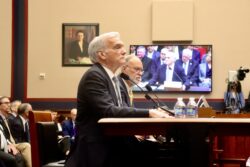Representatives from the Middle States Commission on Higher Education will visit Georgetown early next week and make recommendations that will determine whether the University continues to receive federal funding.
As part of the reaccreditation process, more than 100 faculty, students and administrators participated in the drafting of a 129-page “self-study”report that critically analyzes various components of the University and represents “a significant opportunity for members of the Main Campus to reflect comprehensively on where we are and where we are going.”
The Middle States review takes place every 10 years. Georgetown’s last accredition took place in 1992.
The self-study report lists more than 100 different recommendations. They range from specific short-term goals?such as expanding the SafeRides program and setting up a 24-hour caf? in Lauinger Library?to more long-term suggestions. These include fostering a greater understanding of the workings and composition of the Board of Directors and continuing to educate students and faculty about relations with the outside community.
“We’re really writing this document for ourselves, for the future,” said University Provost Dorothy Brown, who co-chaired the Steering Committee that set the overall goals and objectives for the self-study process.
Brown said that student input was valuable throughout the entire process. At least one student served on seven of the nine different task forces, as well as the Steering Committee. Each task force focused on a specific area of the University? such as student life, faculty, and leadership and governance?and made recommendations which were then streamlined into the final report.
“We got very intelligent feedback from students,” Brown said.
According to Associate Professor Kevin Wildes, S.J., who also co-chaired the Steering Committee, students who participated in the self-study process were particularly concerned with securing more space.
Wildes said that students wanted a greater voice in overall University governance. For the past few years, students have been calling for representation on the Board of Directors. The 1992 Middle States Review also mentioned that students were not well included in the governing process, but Brown did say that she has seen a sense of “growing student empowerment” over the course of her tenure as Provost.
The actual report states that “students should be included in the discussions about the vision, direction and plans of the University as often as feasible.” It does not, however, call for a permanent student representative on the Board, though it does call for a permanent faculty representative.
Wildes also highlighted the report’s emphasis on the need to integrate educational programs across the various schools.
The University, Wildes said, is “resource-challenged,” and might benefit from reactiviating the Main Campus Academic Committee, which would be responsible for promoting “educational initiatives across schools,” Wildes said.
Following their visit to campus, representatives from the Middle States Commission submit their own report?which, according to Brown, discusses how “closely we’re living up to our missions.” The report is then forwarded onto the entire Commission, which will submit a final report that states whether or not Georgetown will be reaccredited. According to Brown, the Commission can decide either to reaccredit the University without conditions, reaccredit the University with conditions, or reject reaccredition completely.



